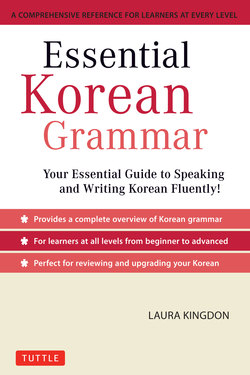Читать книгу Essential Korean Grammar - Laura Kingdon - Страница 10
На сайте Литреса книга снята с продажи.
ОглавлениеGrammatical Terms Used in This Book
I’ve tried to keep grammatical terms to a minimum here so as to avoid confusion and because, honestly, you don’t really need to know what a desiderative auxiliary verb is in order to speak Korean. Here are the absolute bare-minimum terms you should know.
| Term | Korean term | Meaning | Examples |
| Noun | 명사 myeongsa | A word that names an object, person or place | 책 chaek (book)사람 saram (person)동대문 (Dongdaemun—place)민수 (Minsu—male’s name) |
| Action verb | 동사 dongsa | A word that tells you what someone or something does | 가다 gada (to go)하다 hada (to do)먹다 meokda (to eat)살다 salda (to live) |
| Descriptive verbA | 형용사 hyeong yongsa | A word that describes what someone or something is | 아름답다 areumdapda (to be beautiful)빨갛다 ppalgata (to be red)중요하다 jungyohada (to be important)덥다 deopda (to be hot) |
| Adverb | 부사 busa | A word that describes how something is done | 조용히 joyonghi (quietly)빨리 ppal-li (quickly)그래서 geuraeseo (therefore) |
| Pronoun | 대명사 dae myeongsa | A shorthand for a noun | 나/저 (I) na/jeo너/당신 neo/dangsin (you)우리 uri (we) |
| Directional verb | A word that describes the action of going or coming | 가다 gada (to go)오다 oda (to come)돌아가다 doragada (to go back)떠나다 tteonada (to leave) | |
| Past Tense | 과거 gwageo | 했다 haetda (did)먹었다 meogeotda (ate)더웠다 deowotda (was hot) | |
| Present Tense | 현재 hyeonjae | 한다 handa (do)하고 있다 hago itda (doing)아름다운 areumdaun (beautiful) | |
| Future Tense | 미래 mirae | 할 것이다 hal geosida (will do)할 거야 hal geoya (will do—반말)하겠다 hagetda (will do) | |
| PassiveB | 피동사 pidongsa | A verb that describes what is done to something else | 쓰이다 sseu-i-da (to be written/used)보이다 bo-i-da (to be seen)먹히다 meokida (to be eaten) |
| CausativeB | 사동 sadong | A verb that describes the action of making something happen | 안기다 angida (to hug)먹이다 meogida (to feed)씌다다 ssu-i uda (to put something[a hat/glasses] on someone else) |
| Statement | 서술문 seosulmun | A sentence ending in a period that neither orders nor suggests anything to anyone else | 이렇게 해도 돼요.Ireoke haedo dwaeyo.It can be done like this. |
| Question | 의문문 uimunmun | A sentence that asks for information and ends with a question mark | 어떻게 하면 돼요?Eotteoke hamyeon dwaeyo? How should it be done? |
| Command | 명령문 myeong-ryeongmun | An order telling someone else to do something | 이렇게 해 보세요. Ireoke hae boseyo.Try to do it like this. |
| Suggestion | 청유문 cheongyumun | A suggestion to someone else that they do something | 이렇게 할까요?Ireoke halkkayo?Shall we do it this way? |
A In Korean, adjectives are also considered verbs. In their dictionary form they translate to “to be.” For example, 아름답다 means “to be beautiful” and if you want to use it to describe someone, you have to conjugate it appropriately.
B For more on passives and causatives, and the mysteries of their creation, see page 33.
